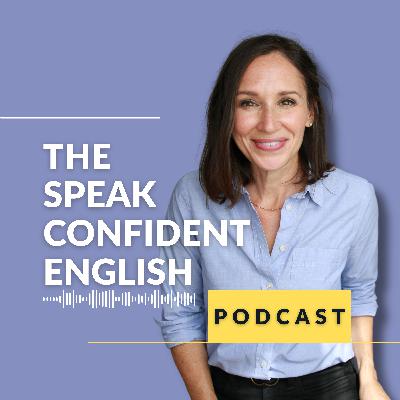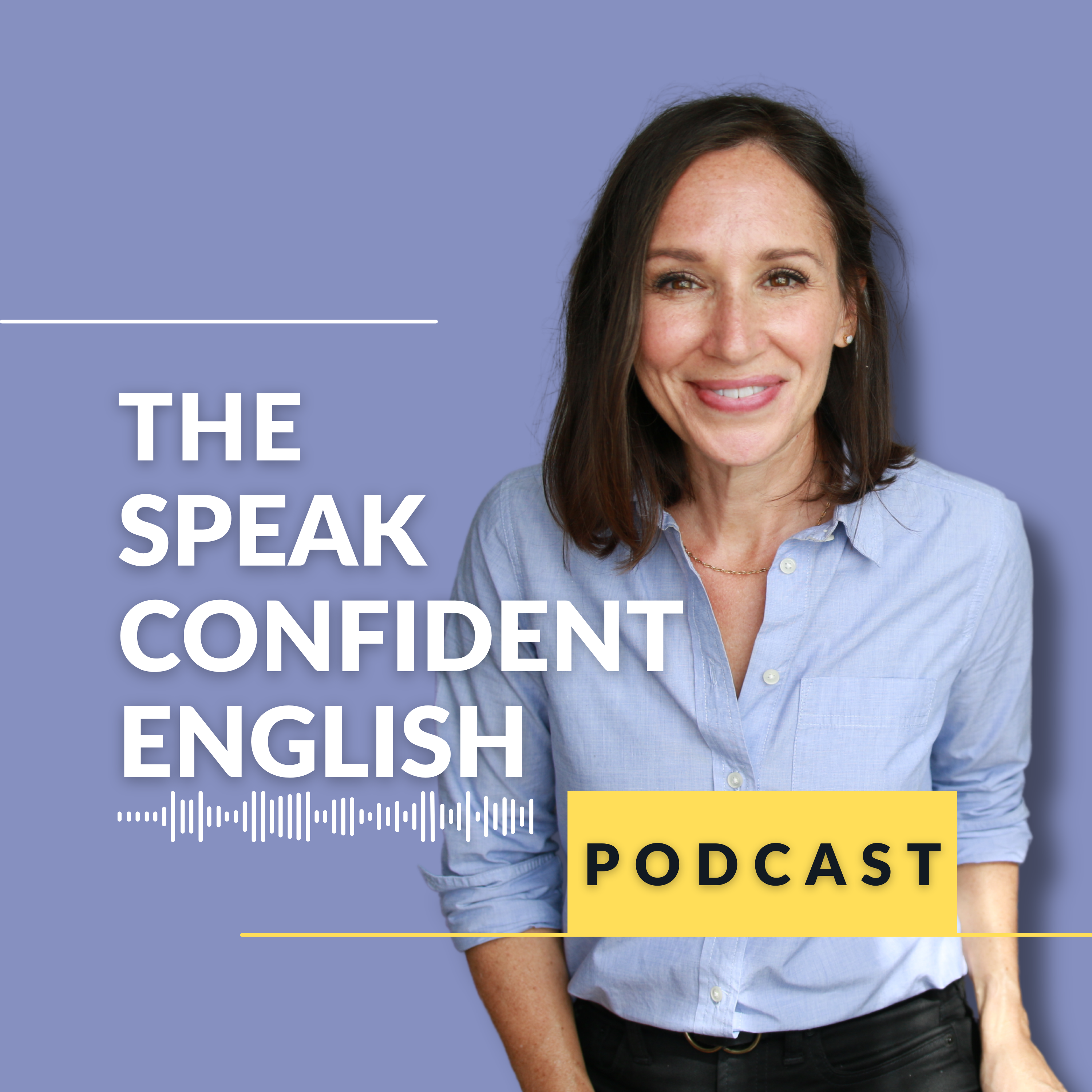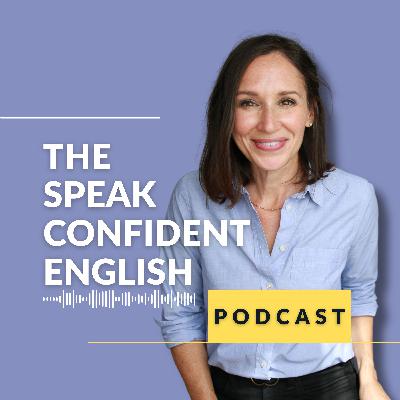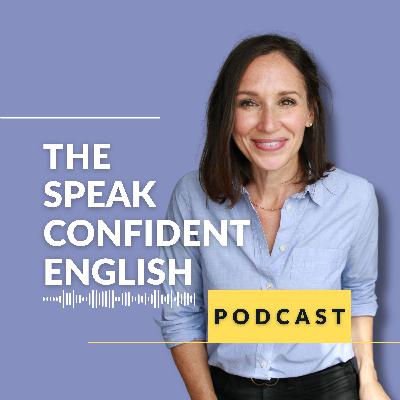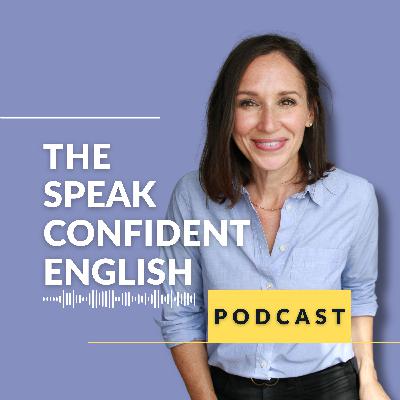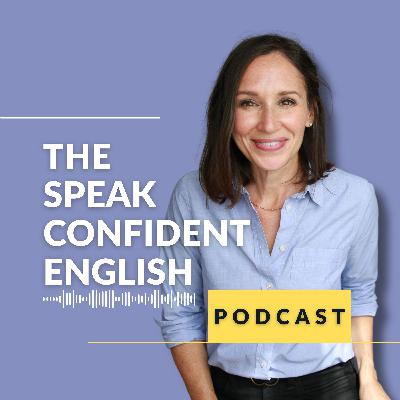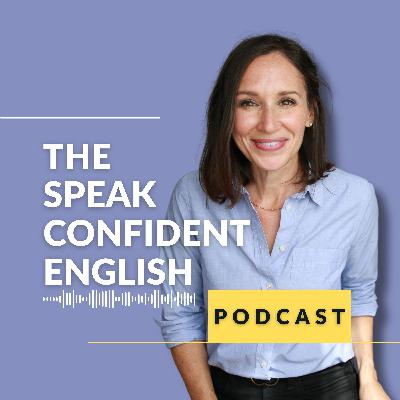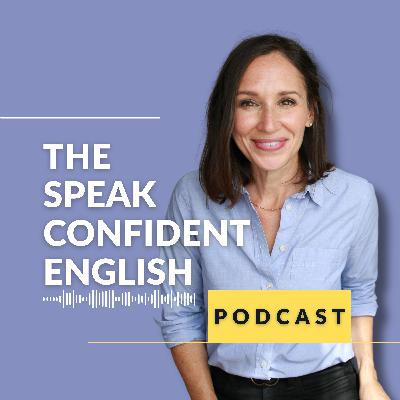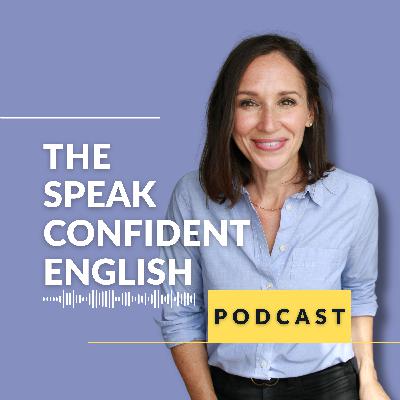Discover The Speak Confident English Podcast
The Speak Confident English Podcast

The Speak Confident English Podcast
Author: Annemarie — Speak Confident English
Subscribed: 318Played: 1,388Subscribe
Share
© Annemarie — Speak Confident English
Description
Build your English confidence and speak fluently — even if you feel shy, stuck, or nervous right now.
I'm Annemarie, the founder of Speak Confident English and an English fluency coach with 20+ years of experience. Every week, I share proven strategies to help you go from, "I understand English," to "I speak it clearly and confidently."
With every episode, learn exactly what to say — and how to say it — so you can speak with calm clarity at work, in conversations, and in everyday life.
🎧 Free Fluency Training →
speakconfidentenglish.com/say-what-you-want-in-english
I'm Annemarie, the founder of Speak Confident English and an English fluency coach with 20+ years of experience. Every week, I share proven strategies to help you go from, "I understand English," to "I speak it clearly and confidently."
With every episode, learn exactly what to say — and how to say it — so you can speak with calm clarity at work, in conversations, and in everyday life.
🎧 Free Fluency Training →
speakconfidentenglish.com/say-what-you-want-in-english
36 Episodes
Reverse
When someone asks why you made a change, said no, or chose a different direction, it can be hard to explain yourself clearly in English. In this episode, we talk about how to talk about priorities in English in real-life conversations — at work, with friends, and with family — without sounding vague, defensive, or unsure. You'll learn practical phrases to help you: explain what matters to you talk about values and priorities naturally set boundaries without over-explaining say no and explain decisions with confidence talk about changes in direction when your priorities shift This episode is especially helpful if you know what matters to you, but struggle to find the right words in the moment — especially when people ask questions or expect an explanation. By the end, you'll have clear, natural language you can use right away in everyday and professional conversations. Episode Timestamps: 00:00 Which Priority Is Right? 02:27 Name Your Priorities 05:56 Explain Your Values 09:59 Set Boundaries 15:25 Explain When Priorities Shift --- Thank you for listening! I share new episodes every Wednesday. Make sure you click the follow button to get notified. Get the full episode show notes at: https://www.speakconfidentenglish.com/talk-about-your-priorities-in-english If you prefer video or want closed captions, you can watch all my episodes on YouTube → https://www.youtube.com/speakconfidentenglish COME SAY 'HI!' Instagram: https://www.instagram.com/speakconfidentenglish/ Facebook: https://www.facebook.com/speakconfidentenglish MORE RESOURCES FOR YOU: How to Get the Confidence to Say What You Want in English (Free Fluency Training) → https://www.speakconfidentenglish.com/say-what-you-want-in-english/ If you enjoyed this episode, please leave a review! It really helps get encouragement and actionable advice to nonnative English speakers around the world.
Talking about disappointment in English can feel overwhelming, especially when things don't go as planned. In this episode, you'll learn natural English phrases for when things go wrong — so you can express your feelings clearly and confidently. We'll explore language for mild, moderate, and intense disappointment, plus phrases for difficult moments, emotional clarity, asking for support, and talking about setbacks in a calm and honest way. You'll also learn how to name what's happening inside when someone asks, "How are you holding up?" and how to stay authentic without oversharing. This lesson is perfect for everyday English conversations, challenging moments at work, or personal situations where you want to feel understood. If you've struggled to find the right words in English when things didn't work out, this episode will give you language you can use right away. If you want more support and real speaking practice, you're welcome to join the Confident Women Community: speakconfidentenglish.com/community Episode Timestamps: 00:00 A Bummer But... 01:56 Levels of Disappointment 07:49 Dealing with Conversations & Emotions 12:05 Phrases to Recover (When You're Not Ready to Talk) 13:51 Asking for Support 17:01 Bouncing Back --- Thank you for listening! I share new episodes every Wednesday. Make sure you click the follow button to get notified. Get the full episode show notes at: https://www.speakconfidentenglish.com/english-phrases-for-when-things-go-wrong If you prefer video or want closed captions, you can watch all my episodes on YouTube → https://www.youtube.com/speakconfidentenglish COME SAY 'HI!' Instagram: https://www.instagram.com/speakconfidentenglish/ Facebook: https://www.facebook.com/speakconfidentenglish MORE RESOURCES FOR YOU: How to Get the Confidence to Say What You Want in English (Free Fluency Training) → https://www.speakconfidentenglish.com/say-what-you-want-in-english/ If you enjoyed this episode, please leave a review! It really helps get encouragement and actionable advice to nonnative English speakers around the world.
In this episode, you'll learn C1 level English vocabulary you can use to talk about happiness, well-being, and your real life in English. These advanced English phrases come from a podcast conversation between Dr. Rangan Chatterjee and Dr. Laurie Santos on the science of happiness. This lesson is perfect if you want to use English confidently in deeper conversations with friends, colleagues, or anyone you care about. Even better? If you struggle to express real thoughts and feelings on complex topics, this episode helps you use clear, natural English when talking about: your emotions your goals and challenges your relationships your everyday well-being I recommend choosing the 4–5 phrases that resonate most and start using them right away. -- If you'd like more real-life English practice in a supportive community, you can learn about the Confident Women Community here: https://speakconfidentenglish.com/community -- Episode Timestamps: 00:00 What We Get Wrong 03:13 How to Practice Today 03:49 Where You'll Use This Vocabulary 04:54 Social Connections 10:30 Practice 13:47 Cost of Technology 18:16 What Happy People Do 22:56 Your Natural Happiness 25:42 Practice --- Thank you for listening! I share new episodes every Wednesday. Make sure you click the follow button to get notified. Get the full episode show notes at: https://www.speakconfidentenglish.com/c1-level-english-vocabulary-for-happiness-and-well-being If you prefer video or want closed captions, you can watch all my episodes on YouTube → https://www.youtube.com/speakconfidentenglish COME SAY 'HI!' Instagram: https://www.instagram.com/speakconfidentenglish/ Facebook: https://www.facebook.com/speakconfidentenglish MORE RESOURCES FOR YOU: How to Get the Confidence to Say What You Want in English (Free Fluency Training) → https://www.speakconfidentenglish.com/say-what-you-want-in-english/ If you enjoyed this episode, please leave a review! It really helps get encouragement and actionable advice to nonnative English speakers around the world.
Does the question "why?" sometimes feel too strong or uncomfortable in English? In this episode, we talk about why "why" can sound rude in English and what you can say instead to keep conversations comfortable and natural. You'll learn six gentle alternatives that help you ask about personal choices, life changes, and meaningful stories without putting pressure on the other person. These simple questions make it easier to stay curious, build trust, and speak confidently in real conversations. In this episode, you'll learn: • Why "why" can sound judgmental or demanding • How tone changes the meaning of your questions • Six natural, polite questions to use instead • Everyday examples you can try right away If you'd like more real-life English practice in a supportive community, you can learn about the Confident Women Community here: https://speakconfidentenglish.com/community Episode Timestamps: 00:00 The Problem with 'Why' 02:40 Alternatives to 'Why' 03:06 What Brought You... 04:26 What Led You To... 05:41 How Did That Come About... 06:54 What Made You Think Of... 07:57 What Inspired... 09:20 I'd Love to Hear How... 10:50 Recap & Practice --- Thank you for listening! I share new episodes every Wednesday. Make sure you click the follow button to get notified. Get the full episode show notes at: https://www.speakconfidentenglish.com/why-sounds-rude-in-english-heres-what-to-say-instead If you prefer video or want closed captions, you can watch all my episodes on YouTube → https://www.youtube.com/speakconfidentenglish COME SAY 'HI!' Instagram: https://www.instagram.com/speakconfidentenglish/ Facebook: https://www.facebook.com/speakconfidentenglish MORE RESOURCES FOR YOU: How to Get the Confidence to Say What You Want in English (Free Fluency Training) → https://www.speakconfidentenglish.com/say-what-you-want-in-english/ If you enjoyed this episode, please leave a review! It really helps get encouragement and actionable advice to nonnative English speakers around the world.
Being polite in English is important — but sometimes, clarity is kindness. In this episode, you'll learn how to be direct in English without sounding rude, harsh, or impolite. We'll explore the right times to use direct communication in English and the grammar tools that help you sound clear and confident at work — not cold or aggressive. You'll discover how to: ✅ Use imperatives, simple statements, and modal verbs effectively ✅ Give feedback and set boundaries with professionalism ✅ Communicate deadlines and instructions with confidence ✅ Improve your English communication skills and sound confident, not rude If you want to practice speaking English this way in real conversation, join my Confident Women Community — a supportive space to use your English for real 👉 https://speakconfidentenglish.com/community Episode Timestamps: 00:00 Was no one listening? 03:23 When to be direct 07:01 Choosing the right grammar 08:07 Imperatives 09:05 Statements 09:44 Modals 11:42 Tone 15:57 Practice --- Thank you for listening! I share new episodes every Wednesday. Make sure you click the follow button to get notified. Get the full episode show notes at: https://www.speakconfidentenglish.com/be-direct-in-english If you prefer video or want closed captions, you can watch all my episodes on YouTube → https://www.youtube.com/speakconfidentenglish COME SAY 'HI!' Instagram: https://www.instagram.com/speakconfidentenglish/ Facebook: https://www.facebook.com/speakconfidentenglish MORE RESOURCES FOR YOU: How to Get the Confidence to Say What You Want in English (Free Fluency Training) → https://www.speakconfidentenglish.com/say-what-you-want-in-english/ If you enjoyed this episode, please leave a review! It really helps get encouragement and actionable advice to nonnative English speakers around the world.
When English conversations get tense, your words can decide whether things end in frustration or progress. In this episode, you'll learn how to sound more professional in English with 5 powerful "were" phrases that help you: Disagree politely without sounding rude Offer feedback and advice clearly Keep your tone calm, confident, and professional These simple professional English phrases will help you handle difficult conversations at work and speak with clarity and respect in any situation. 💬 Try this: Practice one phrase this week and notice how it changes the tone of your next meeting. Free Training: Want more strategies like this? Join my free video training: Get the Confidence to Say What You Want in English 👉 https://www.speakconfidentenglish.com/say-what-you-want-in-english/ Episode Timestamps: 00:00 Why the pillow? 01:50 Why you need 'were' 03:43 If I were to... 04:58 If I were in your situation... 06:19 Practice 06:54 I wish it were... 08:23 Suppose we were... 09:51 I'd rather it were... 11:42 Practice --- Thank you for listening! I share new episodes every Wednesday. Make sure you click the follow button to get notified. Get the full episode show notes at: https://www.speakconfidentenglish.com/sound-more-professional-in-english If you prefer video or want closed captions, you can watch all my episodes on YouTube → https://www.youtube.com/speakconfidentenglish COME SAY 'HI!' Instagram: https://www.instagram.com/speakconfidentenglish/ Facebook: https://www.facebook.com/speakconfidentenglish MORE RESOURCES FOR YOU: How to Get the Confidence to Say What You Want in English (Free Fluency Training) → https://www.speakconfidentenglish.com/say-what-you-want-in-english/ If you enjoyed this episode, please leave a review! It really helps get encouragement and actionable advice to nonnative English speakers around the world.
The secret to never sounding nervous in English? Controlling your voice. Have you ever listened to a coworker or friend speak English who sounds perfectly confident, even though she felt nervous inside? How did she do it? The key is to control your voice so you sound confident in English. Controlling your voice and projecting confidence when you speak helps to engage your listeners and inspire trust. And the strategies you'll learn here will help you give a formal presentation to a room of 537 people or speak in a meeting with 3 coworkers. Use these 4 simple steps to reduce the nervousness of your voice so you sound clear and in control. Episode Timestamps: 00:00 - What does a nervous voice sound like? 03:02 - Step 1: Remove the anxiety 06:49 - Step 2: Be Conscious of Your Flow 10:05 - Step 3: Be clear and project 13:30 - Step 4: Relax and enjoy --- Thank you for listening! I share new episodes every Wednesday. Make sure you click the follow button to get notified. Get the full episode show notes at: https://www.speakconfidentenglish.com/control-your-voice-sound-confident/ If you prefer video or want closed captions, you can watch all my episodes on YouTube → https://www.youtube.com/speakconfidentenglish COME SAY 'HI!' Instagram: https://www.instagram.com/speakconfidentenglish/ Facebook: https://www.facebook.com/speakconfidentenglish MORE RESOURCES FOR YOU: How to Get the Confidence to Say What You Want in English (Free Fluency Training) → https://www.speakconfidentenglish.com/say-what-you-want-in-english/ If you enjoyed this episode, please leave a review! It really helps get encouragement and actionable advice to nonnative English speakers around the world.
Learn how to explain a decision in English clearly and confidently in this practical leadership English lesson. You'll discover a simple 4-step method to organize your ideas, express your reasoning, and speak with clarity. Perfect for professional English communication and meetings. In this episode, you'll learn how to: ✅ Share your thought process naturally ✅ Use key decision-making vocabulary in English ✅ Speak clearly in meetings and interviews ✅ Build confidence through real-world examples This Confident English lesson is part of our ongoing series to help you build English fluency and communication skills for everyday and professional success. 💬 Ready for real conversation practice? Join the Confident Women Community — the safe, supportive space where women practice speaking English with confidence. https://www.speakconfidentenglish.com/community Episode Timestamps: 00:00 Explaining "Why" — the Challenge 01:58 The "STEP" Method 02:53 Step 1: Set the Scene 05:08 Step 2: Tell Your Thought Process 07:32 Step 3: Explain the Options 09:51 Step 4: Present the Decision 12:10 Where/How to Practice --- Thank you for listening! I share new episodes every Wednesday. Make sure you click the follow button to get notified. Get the full episode show notes at: https://www.speakconfidentenglish.com/explain-a-decision-in-english If you prefer video or want closed captions, you can watch all my episodes on YouTube → https://www.youtube.com/speakconfidentenglish COME SAY 'HI!' Instagram: https://www.instagram.com/speakconfidentenglish/ Facebook: https://www.facebook.com/speakconfidentenglish MORE RESOURCES FOR YOU: How to Get the Confidence to Say What You Want in English (Free Fluency Training) → https://www.speakconfidentenglish.com/say-what-you-want-in-english/ If you enjoyed this episode, please leave a review! It really helps get encouragement and actionable advice to nonnative English speakers around the world.
Talk about your personal growth in English using 12 powerful phrasal verbs. In this English phrasal verbs lesson, you'll discover natural ways to describe life changes, mindset shifts, and new beginnings — perfect to improve speaking confidence and express yourself more naturally. In this episode, you'll learn how to: • Talk about new beginnings and letting go • Describe identity and mindset shifts • Express slow, steady personal growth in English This self-growth English lesson will help you find the right words to describe your journey — in life and in English. 🌐 Learn more or practice with me inside the Confident Women Community → https://www.speakconfidentenglish.com/community Episode Timestamps: 00:00 Common English Conversation Questions 01:19 Phrasal Verbs for New Beginnings 06:27 Phrasal Verbs on Mindset Shifts 09:58 Phrasal Verbs on Sustainable Change 11:49 Practice --- Thank you for listening! I share new episodes every Wednesday. Make sure you click the follow button to get notified. Get the full episode show notes at: https://www.speakconfidentenglish.com/conversations-on-personal-growth-in-english If you prefer video or want closed captions, you can watch all my episodes on YouTube → https://www.youtube.com/speakconfidentenglish COME SAY 'HI!' Instagram: https://www.instagram.com/speakconfidentenglish/ Facebook: https://www.facebook.com/speakconfidentenglish MORE RESOURCES FOR YOU: How to Get the Confidence to Say What You Want in English (Free Fluency Training) → https://www.speakconfidentenglish.com/say-what-you-want-in-english/ If you enjoyed this episode, please leave a review! It really helps get encouragement and actionable advice to nonnative English speakers around the world.
Have you ever made a big change — moving to a new country, starting a new job, or beginning again? In this episode of Better English Conversations, you'll learn English vocabulary for life changes — including how to talk about moving, new jobs, and starting over with confidence. You'll discover how to: ✔ Describe emotional transitions with natural, everyday English vocabulary ✔ Use expressions like make a fresh start, take the plunge, and turn over a new leaf ✔ Talk about big decisions and changes in your life — clearly and naturally Whether you're moving abroad, changing careers, or simply ready for something new, this episode will help you improve your English speaking confidence and connect your story to real-life English conversations. 🎧 Subscribe for weekly lessons on Better English Conversations and learn how to speak with clarity and courage in every part of your life. For more practice and community support, visit → https://www.speakconfidentenglish.com/community Episode Timestamps: 0:00 English Conversations on Major Life Changes 1:11 Starting New Vocabulary 6:05 Moving Vocabulary 11:22 Changing Careers Vocabulary 15:50 Example Sentences 16:37 Support Network Vocabulary 19:22 Example Sentences 19:56 Practice --- Thank you for listening! I share new episodes every Wednesday. Make sure you click the follow button to get notified. Get the full episode show notes at: https://www.speakconfidentenglish.com/better-english-conversations-on-major-life-changes If you prefer video or want closed captions, you can watch all my episodes on YouTube → https://www.youtube.com/speakconfidentenglish COME SAY 'HI!' Instagram: https://www.instagram.com/speakconfidentenglish/ Facebook: https://www.facebook.com/speakconfidentenglish MORE RESOURCES FOR YOU: How to Get the Confidence to Say What You Want in English (Free Fluency Training) → https://www.speakconfidentenglish.com/say-what-you-want-in-english/ If you enjoyed this episode, please leave a review! It really helps get encouragement and actionable advice to nonnative English speakers around the world.
Have you ever wanted to give a compliment in English to a colleague or manager — but stopped yourself because you weren't sure what to say? Maybe you worried it would sound awkward or too personal. In this episode, I'll show you exactly how to give compliments in English at work with confidence. You'll learn two simple formulas you can copy, plus real examples of workplace English compliments that sound natural and professional. Here's what you'll discover in this lesson: Why compliments matter in English-speaking workplaces 2 clear structures for professional English compliments Examples of compliments in English you can use right away What to avoid so your compliments don't cross a line By the end, you'll know how to compliment your colleagues in English with short, sincere phrases that build trust and connection. 👉 If you enjoy this episode, follow the podcast so you never miss a new Confident English lesson. Episode Timestamps: 00:00 The Challenge of Compliments in English 01:02 Why Compliments Matter 02:01 How to Give Compliments 02:50 Compliment Structure 1 05:41 Compliment Structure 2 08:43 The Way You Say It 10:39 When, Where, & To Whom 12:22 Dos and Don'ts 13:55 Practice --- Thank you for listening! I share new episodes every Wednesday. Make sure you click the follow button to get notified. Get the full episode show notes at: https://www.speakconfidentenglish.com/how-to-compliment-colleagues-at-work-in-english/ If you prefer video or want closed captions, you can watch all my episodes on YouTube → https://www.youtube.com/speakconfidentenglish COME SAY 'HI!' Instagram: https://www.instagram.com/speakconfidentenglish/ Facebook: https://www.facebook.com/speakconfidentenglish MORE RESOURCES FOR YOU: How to Get the Confidence to Say What You Want in English (Free Fluency Training) → https://www.speakconfidentenglish.com/say-what-you-want-in-english/ If you enjoyed this episode, please leave a review! It really helps get encouragement and actionable advice to nonnative English speakers around the world.
Do you ever wonder why you know English but don't feel confident speaking it? Here's the truth: English confidence isn't a feeling. It's a skill you can build — and in this episode, I'll show you how. You'll learn: Why waiting to "feel confident" keeps you stuck How to overcome nervousness in English and use it as fuel The two main reasons confidence falls apart — and how to fix them A 3-step process to build real, lasting English speaking confidence By the end, you'll know how to act with confidence in English — even when your heart is racing. Want to practice these strategies with me in real conversations? Learn more about Fluency School: https://www.speakconfidentenglish.com/fluencyschool Episode Timestamps: 00:00 Confidence is a choice. And a skill. 03:04 Rethink nervousness 04:32 Why confidence falls apart 06:59 3 Steps to build English confidence --- Thank you for listening! I share new episodes every Wednesday. Make sure you click the follow button to get notified. Get the full episode show notes at: https://www.speakconfidentenglish.com/english-confidence-is-a-skill If you prefer video or want closed captions, you can watch all my episodes on YouTube → https://www.youtube.com/speakconfidentenglish COME SAY 'HI!' Instagram: https://www.instagram.com/speakconfidentenglish/ Facebook: https://www.facebook.com/speakconfidentenglish MORE RESOURCES FOR YOU: How to Get the Confidence to Say What You Want in English (Free Fluency Training) → https://www.speakconfidentenglish.com/say-what-you-want-in-english/ If you enjoyed this episode, please leave a review! It really helps get encouragement and actionable advice to nonnative English speakers around the world.
Ever start speaking English… and suddenly forget the word you need? Your mind goes blank. You freeze. And it feels like your confidence disappears. In this episode, you'll learn what to do in that exact moment — so you can recover quickly and keep going with calm, clarity, and confidence. What you'll learn today: – Why freezing doesn't mean your English is bad – The 3 Rs: a proven method to recover when your mind goes blank – Real recovery phrases fluent speakers use in everyday conversation – How to stay focused under pressure (without striving for perfection) This episode is especially helpful if you're a shy English speaker, struggle with English speaking anxiety, or want more tools to think in English when it matters most. 🎧 Listen, take what works for you, and practice using one recovery phrase today. ✨ Want to go further? In Fluency School, you'll train for real conversations, learn how to manage pressure, and speak with more confidence — even when things don't go perfectly. 👉 Learn more at speakconfidentenglish.com/fluencyschool Episode Timestamps: 00:00 Fluency speakers forget words 01:24 Why you forget words when speaking 04:18 The 4 'Rs' to stay fluent 04:35 Step 1: Recenter 06:12 Step 2: Return 07:42 Step 3: Relax 12:58 What's next for you --- Thank you for listening! I share new episodes every Wednesday. Make sure you click the follow button to get notified. Get the full episode show notes at: https://www.speakconfidentenglish.com/forget-words-in-english If you prefer video or want closed captions, you can watch all my episodes on YouTube → https://www.youtube.com/speakconfidentenglish COME SAY 'HI!' Instagram: https://www.instagram.com/speakconfidentenglish/ Facebook: https://www.facebook.com/speakconfidentenglish MORE RESOURCES FOR YOU: How to Get the Confidence to Say What You Want in English (Free Fluency Training) → https://www.speakconfidentenglish.com/say-what-you-want-in-english/ If you enjoyed this episode, please leave a review! It really helps get encouragement and actionable advice to nonnative English speakers around the world.
Stuck in English? You're not imagining it — and you're not at a dead end. If you've been practicing regularly but feel like your progress has disappeared, this episode will help you understand why. You'll learn: ✔ What causes English learning plateaus (aka feeling stuck) ✔ The difference between stagnation and consolidation ✔ What's happening in your brain during slow progress ✔ Three specific strategies to move forward This episode is especially useful if you: – Feel stuck at the intermediate level – Struggle to speak English naturally, even after years of learning – Want research-backed ways to shift your practice and gain traction 🎯 Want deeper support to speak clearly and confidently in real conversations? Join me for Fluency School → https://www.speakconfidentenglish.com/fluencyschool Episode Timestamps: 00:00 Is being stuck okay? 00:52 What's a plateau? 03:46 Why you're in a plateau in English 06:42 Why plateaus can be a good thing 08:54 Method 1 to reach your next breakthrough 14:40 Method 2 to reach your next breakthrough 18:34 Method 3 to reach your next breakthrough 21:32 What's next in your English progress --- Thank you for listening! I share new episodes every Wednesday. Make sure you click the follow button to get notified. Get the full episode show notes at: https://www.speakconfidentenglish.com/feel-stuck-in-english If you prefer video or want closed captions, you can watch all my episodes on YouTube → https://www.youtube.com/speakconfidentenglish COME SAY 'HI!' Instagram: https://www.instagram.com/speakconfidentenglish/ Facebook: https://www.facebook.com/speakconfidentenglish MORE RESOURCES FOR YOU: How to Get the Confidence to Say What You Want in English (Free Fluency Training) → https://www.speakconfidentenglish.com/say-what-you-want-in-english/ If you enjoyed this episode, please leave a review! It really helps get encouragement and actionable advice to nonnative English speakers around the world.
Struggling to stay consistent in English? Feeling stuck — or frustrated with mistakes? After 10 years of teaching Fluency School and reaching 1 million YouTube subscribers, I've learned a few things about what really helps women build confidence and fluency in English. In this episode, I'm sharing 3 personal lessons that can shift the way you think about your English journey — especially if you're a perfectionist or constantly feel like you're not doing enough. You'll learn: What real consistency looks like (and how to stop feeling guilty when life happens) How to get clear on your priorities so you can make real progress Why mistakes are essential — even when they feel uncomfortable ✨ If you're ready to go deeper and want expert support, you can learn more about my signature program, Fluency School, here: https://www.speakconfidentenglish.com/fluencyschool/ Episode Timestamps: 00:00 Celebrating This Month — 1 Million Subscribers 03:18 Lesson 1: The Power of Consistency (but not like you think) 06:34 Lesson 2: Knowing What's Important 09:24 Lesson 3: The One that Annoys Me 11:46 Most Important of All — Thank You --- Thank you for listening! I share new episodes every Wednesday. Make sure you click the follow button to get notified. Get the full episode show notes at: https://www.speakconfidentenglish.com/build-english-fluency-and-confidence-lessons-from-1-million-subscribers If you prefer video or want closed captions, you can watch all my episodes on YouTube → https://www.youtube.com/speakconfidentenglish COME SAY 'HI!' Instagram: https://www.instagram.com/speakconfidentenglish/ Facebook: https://www.facebook.com/speakconfidentenglish MORE RESOURCES FOR YOU: How to Get the Confidence to Say What You Want in English (Free Fluency Training) → https://www.speakconfidentenglish.com/say-what-you-want-in-english/ If you enjoyed this episode, please leave a review! It really helps get encouragement and actionable advice to nonnative English speakers around the world.
Learn English vocabulary with me in this must-know English vocabulary lesson inspired by Mel Robbins' Let Them Theory. In this episode, you'll improve English vocabulary, discover advanced English phrases for daily life, and build English fluency with words that help you speak naturally and confidently. Most English lessons give you lists of words that are correct but rarely used in real conversations. That's not fluency. Here's why these phrases matter: You'll recognize the words real people use in everyday English conversations. You'll understand the cultural meaning behind them so you don't miss what's happening. And you'll practice them in context so they come to you naturally, without translation or hesitation. ✨ What you'll hear in this episode: Essential English words and idioms from Mel Robbins' Let Them Theory Everyday English expressions like "drop the oars" and "strike a nerve" Why learning cultural context helps you speak English fluently Episode Timestamps: 00:00 Your conversations on 'Let Them' 01:47 Avoid this Vocab Mistake 03:48 The 4 'Chapters' 04:17 What is "Let Them?" 10:27 When 'Let Them' doesn't work 13:59 How to use 'Let Them' 19:06 'Let Them' in Relationships 21:25 Time to practice 👉 Want more? Join me inside the Confident Women Community for lessons + live practice: https://speakconfidentenglish.com/community --- Thank you for listening! I share new episodes every Wednesday. Make sure you click the follow button to get notified. Get the full episode show notes at: https://www.speakconfidentenglish.com/learn-advanced-english-vocabulary-with-mel-robbins-let-them If you prefer video or want closed captions, you can watch all my episodes on YouTube → https://www.youtube.com/speakconfidentenglish COME SAY 'HI!' Instagram: https://www.instagram.com/speakconfidentenglish/ Facebook: https://www.facebook.com/speakconfidentenglish MORE RESOURCES FOR YOU: How to Get the Confidence to Say What You Want in English (Free Fluency Training) → https://www.speakconfidentenglish.com/say-what-you-want-in-english/ If you enjoyed this episode, please leave a review! It really helps get encouragement and actionable advice to nonnative English speakers around the world.
Struggling to write professional emails in English that sound clear, polite, and natural? Whether you're drafting them yourself or using AI tools like ChatGPT or Gemini, this episode will help you write better emails in English — with professional tips you can start using today. You'll learn: How to avoid common email mistakes Phrases that help you sound professional without being too formal Ways to improve your email writing skills in English for business or work How to use AI for emails without losing your authentic voice When NOT to rely on AI — especially for sensitive or high-stakes messages By the end, you'll know exactly how to write professional emails that are clear, polite, and effective — and that help you build trust in every conversation. Episode Timestamps: 00:00 Using AI for emails in English? 02:45 What emails need — even without AI 05:55 Getting the tone right 11:07 3 steps to make emails sound like you 14:31 When not to use AI --- Thank you for listening! I share new episodes every Wednesday. Make sure you click the follow button to get notified. Get the full episode show notes at: https://www.speakconfidentenglish.com/write-better-emails-in-english-professional-tips-with-ai If you prefer video or want closed captions, you can watch all my episodes on YouTube → https://www.youtube.com/speakconfidentenglish COME SAY 'HI!' Instagram: https://www.instagram.com/speakconfidentenglish/ Facebook: https://www.facebook.com/speakconfidentenglish MORE RESOURCES FOR YOU: How to Get the Confidence to Say What You Want in English (Free Fluency Training) → https://www.speakconfidentenglish.com/say-what-you-want-in-english/ If you enjoyed this episode, please leave a review! It really helps get encouragement and actionable advice to nonnative English speakers around the world.
Do you struggle with when to use make and when to use do in English? They're definitely tricky. Even advanced learners get confused by these verb combinations. In this episode, you'll learn the real difference between make vs do in English, and discover 20+ advanced collocations that fluent speakers use in daily conversations, professional settings, and written communication. Understand why we say "make a decision" but "do research" Learn collocations that improve clarity, fluency, and confidence Avoid common mistakes with English verbs make and do Practice with a mini quiz to check your progress 🔗 Mentioned in this episode: How to Learn & Remember Phrasal Verbs (5-Minute Routine): https://www.speakconfidentenglish.com/learn-english-phrasal-verbs-faster/ Economic Vocabulary in English: https://www.speakconfidentenglish.com/english-economic-vocabulary/ Episode Timestamps: 00:00 Is it 'Make' or 'Do'? 01:25 Tip for Choosing Make vs Do 02:36 Collocations with Make 07:12 Collocations with Do 11:13 Exceptions to General Rules 14:46 Quiz --- Thank you for listening! I share new episodes every Wednesday. Make sure you hit the follow button to get notified. Get the full episode show notes at: https://www.speakconfidentenglish.com/make-vs-do-in-english-advanced If you prefer video or want closed captions, you can watch all my episodes on YouTube → https://www.youtube.com/speakconfidentenglish COME SAY 'HI!' Instagram: https://www.instagram.com/speakconfidentenglish/ Facebook: https://www.facebook.com/speakconfidentenglish MORE RESOURCES FOR YOU: How to Get the Confidence to Say What You Want in English (Free Fluency Training) → https://www.speakconfidentenglish.com/say-what-you-want-in-english/ If you enjoyed this episode, please leave a review! It really helps get encouragement and actionable advice to nonnative English speakers around the world.
Have you ever wanted to describe a close friend in English… but didn't know the words to explain your connection? In this episode, we explore the exact vocabulary and natural phrases you need to talk about friendships—whether you're describing a childhood friend, a long-distance friendship, or how a relationship has changed over time. You'll learn how to: Describe types of friendships in English (work friends, lifelong, long-distance…) Use emotional vocabulary to talk about connection and trust Talk about how friendships begin, grow, or drift apart Express what makes a friendship strong and how to maintain it If you've ever thought, "I don't know how to describe my friendships in English," this episode gives you the clarity and confidence to do exactly that. Episode Timestamps: 00:00 Easy in your native language but not English? 02:15 Types of friends in English 06:48 Describing closeness in English 10:05 Describing what you do with friends 12:33 Describing new friendships 15:50 Describing challenges & changes 20:24 Talking about maintaining friendships 22:54 How to practice --- Thank you for listening! I share new episodes every Wednesday. Make sure you hit the follow button to get notified. Get the full episode show notes at: https://www.speakconfidentenglish.com/talking-about-friendship-in-english If you prefer video or want closed captions, you can watch all my episodes on YouTube → https://www.youtube.com/speakconfidentenglish COME SAY 'HI!' Instagram: https://www.instagram.com/speakconfidentenglish/ Facebook: https://www.facebook.com/speakconfidentenglish MORE RESOURCES FOR YOU: How to Get the Confidence to Say What You Want in English (Free Fluency Training) → https://www.speakconfidentenglish.com/say-what-you-want-in-english/ If you enjoyed this episode, please leave a review! It really helps get encouragement and actionable advice to nonnative English speakers around the world.
Have you ever wanted to help someone, but stayed quiet because you didn't know how to say it in English? In this episode, you'll learn exactly how to offer help in English politely, without sounding pushy or making someone uncomfortable. I'll walk you through a 4-step method to help you support others in a way that feels clear, kind, and culturally appropriate—whether at work, with friends, or in emotionally sensitive situations. You'll learn how to: • Show empathy without overstepping • Use specific English phrases to offer help • Speak with confidence in professional and personal conversations Episode Timestamps: 00:00 Thinking about offering help? Should you or shouldn't you? 02:05 Here's the right way to offer help 02:59 Step 1: Notice 05:14 Step 2: Empathy 08:45 Step 3: Express offer 11:46 Step 4: Do 15:12 Recap & Practice --- Thank you for listening! I share new episodes every Wednesday. Make sure you hit the follow button to get notified. Get the full episode show notes at: https://www.speakconfidentenglish.com/offer-for-help-in-english/ If you prefer video or want closed captions, you can watch all my episodes on YouTube → https://www.youtube.com/speakconfidentenglish COME SAY 'HI!' Instagram: https://www.instagram.com/speakconfidentenglish/ Facebook: https://www.facebook.com/speakconfidentenglish MORE RESOURCES FOR YOU: How to Get the Confidence to Say What You Want in English (Free Fluency Training) → https://www.speakconfidentenglish.com/say-what-you-want-in-english/ If you enjoyed this episode, please leave a review! It really helps get encouragement and actionable advice to nonnative English speakers around the world.


